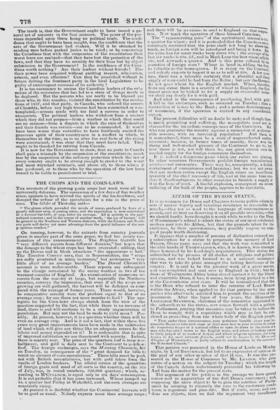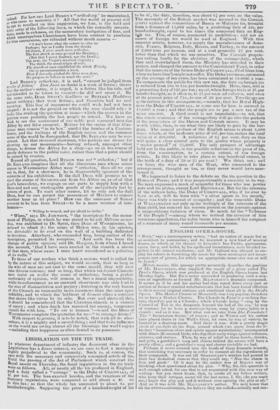AFFAIR OF THE BYRON STATUE.
IT is so common for Deans and Chapters to incur public odium by acts of narrow bigotry mid vexatious resistance to reasonable de• maids,—they are so used to the language of contemptuous re preach, and so bent on deserving it on all possible occasions,—that we should hardly have thought it worth while to refer to the Dean of Westminster's refusal to admit the statue of our most celebrated modern poet into his Abbey, but that the grounds taken for the exclusion, by their speciousness, may possibly impose on some good people worth disabusing. It appears that a number of persons of distinction entered into a subscription for a statue to perpetuate the memory of Lord Beene, fifteen years ago; and that the work was committed to the able hands of THORIVALDSEN, who, it is known, was amongst those honoured by his Lordship's acquaintance. This statue was subscribed for by persons of all shades of religious and political opinion, and was looked forward to as a national monument that was to take its place amongst the lasting heirlooms of the country. It is said to be the greatest work of a great master, mid was completed and sent over to England in 1834 ; but the doors of Westminster Abbey being closed against it by the liberal and charitable Dean, it has, it seems, been lying packed in a boa at the Customhouse ever since. It will be remembered that this is the Dean who refused to inter the remains of Lord BYROM within the Abbey, when applied to for that purpose by the same parties who afterwards solicited him to permit the erection of the monument. After the lapse of four years, the Honourable LEICESTER STANHOPE, chairman of the committee appointed by the subscribers to the statue, now conies forward with a petition to Parliament, praying that measures may be taken to induce the Dean to comply with a requisition which may in fact be con- idererl as proceeding from the whole body of' the English people, " That, under these circumstances, your petitioner humbly prays your ho. uourahle House to take such steps as shall seem best in your wisdom to induce the temporary keeper of a national edifice to open its doors to the statue of a man who has added lustre to the English name, and whose orthodoxy cannot he fairly judged of in works of fiction, and whose religious opinions, not being known to his most intimatefriends, could not be known to the Dean and Chapter of Westminster, or justly subject to condemnation by the censors of the Reformed Church."
This petition was presented in the House of Lords on Monday night, by Lord BROUGHAM, but led to no expression of opinion on the part of any other member of that ilouee. It was also pre- sented in the House of Commons by Mr. LEADER, who gave
notice of a motion on the subject for Tuesday ; which the length of the Canada debate unfortunately prevented his following up. And here the matter for the present rests. The argument of the petition in the passage we have quoted comes well in aggravation of the dull Dean's contumacy; and, supposing the mere object to be to gain the sanction of Parlia- ment by seeming to reconcile the case to the customary condi- tions, is ingenious and plausible. But if truth, sense, and can-
indeed, For how can Lord ThestoN's "orthodoxy" be maintained, or who cares to maintain it ? All that the world at present will he apt to recollect on this suggestion, we fear, is the bold and witty satire of the following lines, in which the cowardly recanta. lions, made in sickness, on the momentary instigation of fear, and which unscrupulous Churchmen have been content to proclaim fir true conversions, are ridiculed without much reserve - " 1 don't know what the reason is—the air
Perhaps; but as I suffer from the shocks Of illness, I grow muds more orthodox. The first attack at once proved the Divinity; (But that I never doubted, nor the Devil ;) The next, the Virgin's mystical virginity ;
The third, the usual origin of evil ;
The fourth at once established the whole Trinity On so uncontrovertible a level, That I devoutly wished the three were four, On purpose to believe so much the snore."
Lord BYRON'S orthodoxy, it is said, "cannot be judged from works of fiction. Don Juan no doubt is a work of fiction ; there- fore the author's satire, it is urged, is a fiction like his tale, and not intended to be taken in earnest—he did not mean it. By the same rule, Dean SWIFT'S Gulliver or BUTLER'S Hudibras meant nothing; they were fictions, and therefore had no real meaning. This line of argument we could wish had not been adopted : it is not the ground on which the case should rely : it looks like evading the question at issue—which the movers in the petition were probably the last people to intend. We have no wish to see the monument of our noble pout conveyed into the Abbey by any false passport. Rather let the statue of that illus- trious man remain "in its box" amidst the lumber of a Custom- house, and the feelings of the English nation and the common sense of the world be disregarded, that Dr. IRELAND may be con- sistent. Let that reverend showman, who pockets our money for showing us our monuments—having refused, amongst other things, to disuse the Abbey for a shop—ou on in his course of steady defiance to the public voice, rather San that a point should be gained by evasion. Beyond all question, Lord BYRON was not " orthodox ;" but if Dr. IRELAND imagines that all the illustrious men whose ashes repose in Westminster Abbey were " orthodox," then all we can say is, that, for a showman, he is distr''racefully ignorant of the contents of his exhibition. If the dull Dean will promise us to eject the statue Of SHAKSPB ARE from his Abbey on proof of that poet's heterodoxy, we engage on our parts to supply him with a thousand and one irrefragable proofs of the melancholy fact by return of post. To omit other names, let us only ask the dull Dean, how he can permit the monument of MILTON to remain another hour in its place ? How can the successor of SPRAT consent to be less than SPRAT—to be a mere minnow of into- lerance— " Willing to wound, and yet afraid to strike."
" When," says Dr. JOHNSON, " the inscription for the monu- ment of Philips, in which he was stated to be soli Milton° secun- dus, was exhibited to Dr. Sprat, then Dean of Westminster, he refused to admit it : the name of Milton was, in is opinion, too detestable to be read on the wall of a building dedicated to devotion. Atterbury, who succeeded him, being author of the
inscription, permitted its reception. And such has been the change of public opinion,' said Dr. Gregory, from whom I heard this account, 'that I have seen erected in the church a statue of that man, whose name 1 once knew considered as a pollution of its walls.'" To those of our readers who think a serious word is called for by the nature of this subject, we would remark, that as long as the wits of men are not cast in the same mould, they will ever take diverse courses; and so long, that which intolerant Church- men insist on under the name of orthodoxy, being a perfect conformity of opinion, will remain in fact a moral impossibility, while its enforcement as an outward observance can only lead to the sins of dissimulation and perjury ; fostering in the very bosom of the Church an immorality more enormous than the most open infidelity, and to which the boldness of dissent offers a contrast that shows like virtue by its side. But over and above all this, it should be remembered that the Christian church is a church of mercy ; and when death has removed her enemy, vengeance should die with him. "To err is human '—would the Dean of
estminster complete the quotation for us—" to revenge divine?" With respect to genius, it is to be noted, that with all its aber- rations, it is a mighty and a sacred thing ; and that to its influence on the world are owing almost all the blessings the world enjoys —including that happiness so often denied to its possessor.



























 Previous page
Previous page